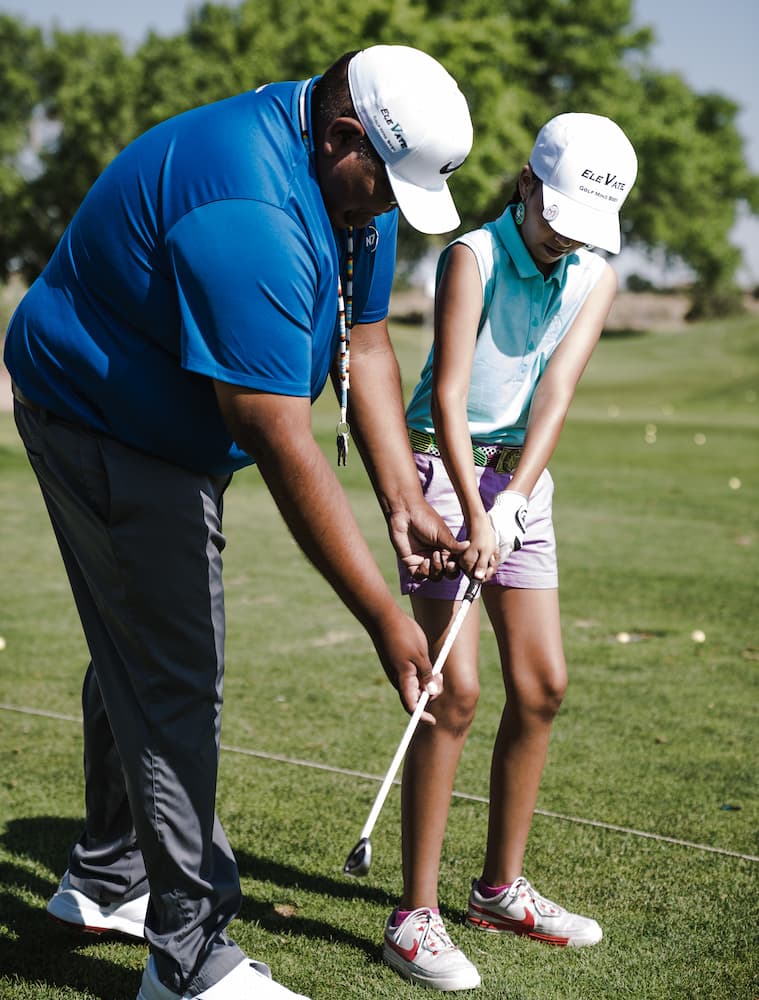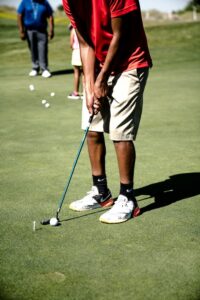If you don’t know anything about golf yet, a quick guide to golf for beginners will help.
A brief history of golf
Golf appeared 1000 years ago in China, but the modern version of this game was born in Scotland in the 1400s. The first official mention of golf was in 1457, when the Scottish Parliament banned the game because it distracted from military training, which was detrimental to the country’s national security. Apparently, the Scots preferred the game of golf to learning the art of archery.
The modern game of golf and the first golf clubs appeared in Scotland. There are also created the first written rules of golf. The first tournaments with an elaborate concept were held between Scottish cities. Soon the game of golf spread throughout England and then around the world. The oldest golf course is the Old Links at the racecourse in Musselborough. Today, in the power of new technology, golf can be played without leaving home, as there are many simulators of the game, but for the hunters of exotic emotions offer a try their hand at online casinos or in sports betting, where there are sections for golf forecasts.
The basic terms in golf
- Hole – 1 – single course of play from tee to green inclusive; 2 – hole in the green, which drives the ball.
- Golf tee – 1 – the area on the course from which play begins on each hole; 2 – the stand of wood or plastic on which the ball may be placed to make the first shot on each hole.
- Fairway – An area of medium length grass that occupies most of the playing field between the tee and the green.
- Green – The area with the shortest soft grass directly around the hole.
- Rough – a “wild” section of tall grass with trees specifically left on the sides of the fairway. A ball caught in the rough is much harder to knock out.
- Bunker – A sand trap specifically made on the field to make it harder for the player to hit. Bunkers can be placed on fairways or next to greens.
- Hazard – An element of the field of play specially constructed or deliberately left on the field (bunker, water barrier) to make it difficult to play.
- Stroke – A swing (swing movement) with the intent to hit the ball. You keep track of the score, but count the strokes. You also need to remember that a miss on the ball can count as a stroke.
- Divot – A piece of turf knocked out at impact.
- Clubhouse – a structure on the golf course, which usually combines the administration offices, locker rooms, restrooms, bar, restaurant for players and guests.
- Driving range – a separate area for processing long shots.
- Putting green – a court with a short – like on conventional greens – grass, in which a few holes were cut. Located off the field of play, usually near the driving range.
Terms for scoring:
- Ace / hole-in-one – hitting the hole with the first (one) shot.
- Eagle – The number of strokes on one hole is two strokes lower than the par of that hole.
- Birdie – the number of strokes on one hole is one less than the par of that hole.
- Par – a conditional standard used to calculate the score and evaluate the level of players. Par is the number of strokes a golfer must make on one hole or the entire course when playing well.
- Bogey is the number of strokes per hole one more than par.
- Double (triple, quadruple) bogey – The number of strokes on one hole is two (three, four) more than the par.
- Handicap – the number indicating the skill level of the golfer, calculated by a rather complicated system and allows you to equalize the chances of beginners and experienced athletes.

Golfing equipment for beginners
Certainly, good golf clubs and golf equipment improve your game, but they don’t play a big role if you are new to golf. Your first golf clubs can get shabby, scratched and even broken, so don’t spend a fortune on a good set until you’ve gotten the hang of the game. Also, keep in mind that there is always the possibility that you won’t be very good at the sport.
Tip for beginners:
- Borrow golf clubs from a friend;
- Rent a set from a golf club;
- Buy used golf clubs on Ebay and similar sites;
- Don’t buy a full set. The following types of clubs are good to start with: a wood, 2 or 3 irons, a Send or Wage, and a putter.
- It is also very important to take some golf lessons. Many people note that golf is intuitive at first, so you need to train your body so that the technique of the game becomes natural to you. It is very important at this stage that the coach corrects mistakes and give appropriate advice.
In any case, golf lessons with a professional are much better than any golf manual.
Competitions and Golf Tournaments
If you’re really getting into the sport, you’ll probably discover watching tournaments on TV, perhaps even attending some in person.
Listed below are the main well-known professional golf tournaments with a brief description of them:
The Four Majors is an annual series of four of the most prestigious tournaments in men’s professional golf:
- The Masters tournaments are held annually in early April invariably at Augusta National Golf Club.
- The US Open is held in mid-June at a different course in the United States.
- The Open is held in mid-July on different golf courses in England and Ireland. The tournament is also known as the British Open.
- The PGA Championship is held in mid-August at various courses in the eastern United States.
Ryder Cup takes place in late September.
You can also attend or participate in amateur tournaments (handicap permitting) to experience this fascinating and unifying atmosphere of golf.
Rules of Golf
There are few official documents governing the rules of golf. The major international golf rules approved by R&A Rules Limited and the United States Golf Association can be found at www.randa.org, www.usga.org.
Golf etiquette
Golf is a most refined sport where etiquette must be followed with the utmost care.
Below are some basic golf etiquette tips for aspiring golfers:
- Don’t talk while hitting anyone;
- Do not walk on another player’s line of play;
- Don’t hit the ball if you see a group playing ahead of you;
- Don’t get angry after every failed hit;
- Don’t be late/arrive on time;
- Have fun.
Handicap
Handicap is a measure of a golfer’s skill; the lower it is, the stronger the player in front of you. Handicaps can be used in any format of play, but only among amateurs, in professional golf there is no handicap system.
A handicap is calculated according to certain rules based on the rounds played by the golfer while meeting certain requirements (qualifying rounds). The handicap system allows players of different levels to compete on a level playing field.
Most courses will not allow you to play a course without a handicap of no higher than that set by a particular club. Typically, a playing handicap should not be higher than 36 for women and not higher than 28 for men. A player’s handicap is confirmed either by the National Association / Golf Federation or the Club of which the player is a member.


